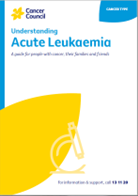- Home
- Acute lymphoblastic leukaemia (ALL)
- Diagnosis
- Classification and prognosis
Classification and prognosis for ALL
Classification
Working out the specific type of acute lymphoblastic leukaemia (ALL) is called classification. It is an important step because it helps doctors to work out the prognosis and suggest the most suitable treatment.
ALL is divided into several subtypes according to the type of lymphocyte (B-cell or T-cell) that has become abnormal and whether the Philadelphia chromosome is present. The tests described here look for these changes.
Prognosis
Prognosis means the expected outcome of a disease. You may wish to discuss your prognosis with your doctor. It is not possible for anyone to predict the exact course of the disease, but your doctor can give you an idea about the likely outcomes for people with your type of ALL.
To work out your prognosis, your doctor will consider test results, the exact type of ALL, whether you have certain changes in the genes (including the Philadelphia chromosome), your white cell count, and other factors such as your age, fitness and medical history. Your doctor will also look at how quickly the initial treatment controlled the leukaemia (achieved remission).
For many people, treatment can achieve remission that lasts for years. The longer the remission lasts, the lower the risk of relapse. In some cases, however, ALL becomes active again (relapses) because a small number of leukaemia cells remained in the body. Those remaining cells are known as minimal residual disease (MRD).
Doctors may measure a person’s MRD to work out the risk of relapse and if more treatment is needed. Immunophenotyping and PCR tests are used to measure a person’s MRD.
→ READ MORE: Your health care team
Podcast: Tests and Cancer
Listen to more of our podcast for people affected by cancer
More resources
Dr Jonathan Sillar, Haematologist, Calvary Mater Newcastle Hospital; Dr Scott Dunkley, Haematologist, Royal Prince Alfred Hospital and Chris O’Brien Lifehouse; Sharon Frazer, Consumer; Dr Robin Gasiorowski, Staff Specialist, Haematology, Concord Hospital; Prof Angela Hong, Radiation Oncologist, Chris O’Brien Lifehouse, and Clinical Professor, The University of Sydney; Yvonne King, 13 11 20 Consultant, Cancer Council NSW; Heather Mackay, Clinical Nurse Consultant – Haematology, Westmead Hospital; Katelin Mayer, Clinical Nurse Consultant, Cancer Outreach Team, Nelune Comprehensive Cancer Centre.
View the Cancer Council NSW editorial policy.
View all publications or call 13 11 20 for free printed copies.
Need to talk?
Support services
Coping with cancer?
Talk or email someone about symptoms or dealing with a diagnosis
Looking for transport or accommodation?
Help with getting to tests or finding a place to sleep
Cancer information
Dealing with the diagnosis
Common reactions to a cancer diagnosis and how to find hope
Explore our resource hub
Explore and download our booklets, fact sheets, podcasts, webinars and videos for people affected by cancer

